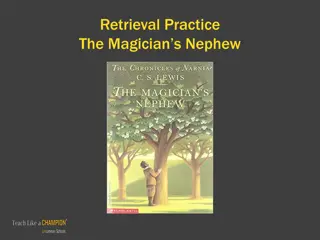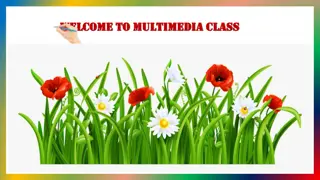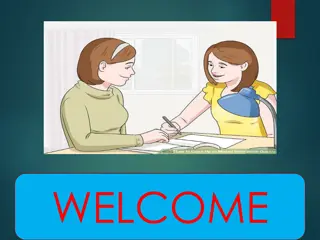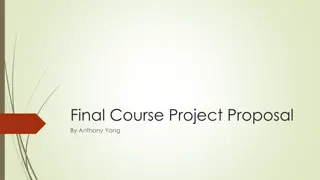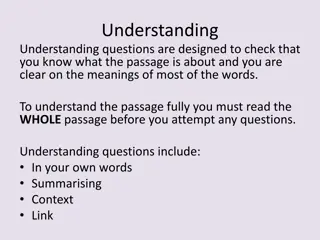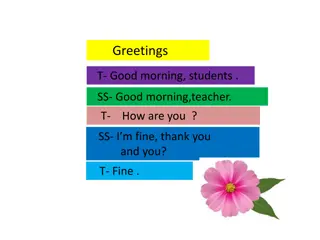Mastering Passage Narration in English - Class 11/12 Lesson
Enhance your skill in transforming direct speech to indirect speech with this comprehensive English lesson. Understand the rules, practice converting sentences, and improve your narration fluency through examples and exercises provided in the class.
Download Presentation

Please find below an Image/Link to download the presentation.
The content on the website is provided AS IS for your information and personal use only. It may not be sold, licensed, or shared on other websites without obtaining consent from the author. Download presentation by click this link. If you encounter any issues during the download, it is possible that the publisher has removed the file from their server.
E N D
Presentation Transcript
WELCOME TO multimedia CLASS WELCOME TO multimedia CLASS
Introduction Class: Eleven/Twelve Subject: English 2nd Paper Narration Time: 50 Minutes Asim Kumar Talukder Lecturer in English Fenchuganj Govt. College Fenchuganj, Sylhet. Email Id: aktalukder@gmail.com 01716348110
Learning outcomes Students will be able to . know the rules of passage narration know how to change narration from direct speech to indirect speech
Why are you loitering and there now? Are you trouble? here Do you feel hungry? in I am loitering because I have none to take care me. now. Yes, very hungry I am
Now look at what they have told Why are you loitering here and there now? Are you in trouble?" said the school teacher. "I am loitering because I have none to take care me," said the boy. The school teacher said, "Do you feel hungry? "Yes. I am very hungry now," said the boy.
Declaration of Lesson Passage Narration
Lets recap from the previous class said/ told/ replied/ asked/ ordered/ requested/ forbade/ advised/ wished/ prayed/ exclaimed (with joy/ sorrow/ wonder) Reporting Verb that/ if/ Interrogative pronoun/ to + verb/ not to + verb Connecting word Need to change the person and tense in reported speech
Pair Work Change the following sentences into Indirect Speech. 1. She said to him, I am leaving now and shall return after two hours. 2. The old man said to the child, Why did you break this window pane? 3. The woman said, What a beautiful child this is! 4. The land lord said to his servant, "Go away and leave the room at once. 5. The father said to his son, "Let us go out for a walk.
Match Your Answer 1. She said to him, I am leaving now and shall return after two hours. She told him that she was leaving then and would return after two hours. 2. The old man said to the child, Why did you break this window pane? The old man asked the child why he had broken that window pane.
3. The woman said, What a beautiful child this is! The woman exclaimed that child was very beautiful. 4. The land lord said to his servant, "Go away and leave the room at once. The land lord ordered his servant to go away and leave the room at once. 5. The father said to his son, "Let us go out for a walk. The father proposeded to his son that they should go out for a walk.
Lets see some rules to change passage narration Rule-01: Read the passage narration from first to last and try to find out the speakers and the listeners. You have to differentiate each speech and its speaker. You may not get the name of speaker in each speech. But observing the context of speeches, you have to mark that. Example: Where do you like to go, sir?" asked the ticket seller. Cox'sBazar, replied the stranger. "How many tickets do you need? I will buy five tickets. Take these tickets. They will cost three thousand taka."
Lets see some rules to change passage narration Rule-02: You have to write the name of speaker and listener of each speech before the speech during changing. You may not get the name with each sentence and you may get the name of speaker at first or last. But during the changing into indirect, you have to put the name of speaker and listener at first. Example: Where do you like to go, sir?" asked the ticket seller. Cox'sBazar, replied the stranger. "How many tickets do you need? I will buy five tickets. Take these tickets. They will cost three thousand taka."
Lets see some rules to change passage narration Rule-03: After identifying the speaker and the listener, you have to determine the mood of the verb in their speeches. Example: Where do you like to go, sir?" asked the ticket seller. Cox'sBazar, replied the stranger. "How many tickets do you need? I will buy five tickets. Take these tickets. They will cost three thousand taka."
Lets see some rules to change passage narration Rule-04: In passage, if there are two or more sentences of the same speaker together, you have to use - and also/ again/ further/ furthermore etc. Example: Where do you like to go, sir?" asked the ticket seller. Cox'sBazar, replied the stranger. "How many tickets do you need? I will buy five tickets. Take these tickets. They will cost three thousand taka."
Lets see some rules to change passage narration Rule-05: There are some certain words or phrases in direct speeches which will be changed in indirect speeches. These are given in my last class. Example: Yes will be replaced by replied in the affirmative.
Lets see some rules to change passage narration Rule-06: If there is any phrase out of inverted commas ( ), you will not change it. You will rewrite the same form of phrase at the beginning of the reporting verb of indirect speech. Example: "Why did you stop me?" asked Riyad. "You were driving too fast," said the traffic sergeant, giving him a glare. Riyad asked the traffic sergeant why he (S) had stopped him. Giving him a glare, the traffic sergeant replied that he(R) had been driving too fast.
Lets see some rules to change passage narration Rule-07: Instead of said, If reported speech has asked/ cried/replied/muttered etc., the reporting verb in the indirect speech will be unchanged. Example: Help me. He cried. (Direct) He cried to help him. (Indirect)
Lets see some rules to change passage narration Rule-08: When reported speech has a note of interrogation (?) after an assertive sentence, the indirect speech will use beingsurprised before the reporting verb. Besides, you have to transform the direct speech into indirect following the structure of interrogative sentence. Example: He said to me, You did it? (Direct) Being surprised he asked me if I had done it. (Indirect)
Why are you loitering here and there now? Are you in trouble?" said the school teacher. "I am loitering because I have none to take care me," said the boy. The school teacher said, "Do you feel hungry? "Yes. I am very hungry now," said the boy. The school teacher asked the boy why he (b) was loitering here and there then and also asked if he (b) was in trouble. The boy replied that he (b) was loitering because he (b) had none to take care him (b). The teacher again asked if he (b) felt hungry. The boy replied in the affirmative and also told that he (b) was very hungry then.
Home work Change the following speech 1. Have you saved something for the future? said the rich man. No, said the cobbler. I am happy with the present and think little about tomorrow. No, that would not do, said the rich man. I like to see you above want. Have this money and keep it.







